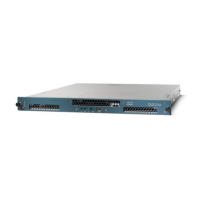Chapter 5 Managing the ACE Software
Using the File System on the ACE
5-12
Cisco 4700 Series Application Control Engine Appliance Administration Guide
OL-11157-01
The keywords, arguments, and options are:
• ftp://server/path[/filename]—Specifies the FTP network server and,
optionally, the configuration filename.
• sftp://[username@]server/path[/filename]—Specifies the SFTP network
server and, optionally, the configuration filename.
• tftp://server[:port]/path[/filename]—Specifies the TFTP network server and,
optionally, the configuration filename.
• running-config—Specifies to replace the running-configuration file
currently residing on the ACE in RAM (volatile memory).
• startup-config—Specifies to replace the startup-configuration file currently
residing on the ACE in Flash memory (nonvolatile memory).
For example, to copy a startup-configuration file from a remote FTP server to the
AC
E, enter:
Host/Admin# copy ftp://192.168.1.2/configs/startup-config-Adm_ctx
startup-config
Using the File System on the ACE
Flash memory stores the operating system, startup-configuration files, software
licenses, core dump files, system message log files, SSL certificates and keys, and
other data on the ACE. Flash memory comprises a number of individual file
systems, or partitions, that include this data.
The ACE contains the following file systems, or partitions:
• disk0:—Contains all startup-configuration files, software licenses, system
message log files, SSL certificates and keys, and user-generated data for all
existing contexts on the ACE.
• image:—Contains the system software images.
• core:—Contains the core files generated after each time that the ACE
becomes unresponsive.
• volatile:—Contains the files residing in the temporary (volatile:) directory.
The volatile: directory provides temporary storage; files in temporary storage
are erased when the ACE reboots.
The Admin context supports all four file systems in the ACE. The user context
sup
ports only the disk0: and volatile: file systems.

